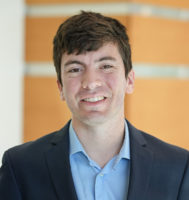Q&A with Alex Burford, MD, MPH, assistant professor, Divisions of Critical Care and Child Protection
 Hometown: Kenosha, Wisconsin
Hometown: Kenosha, Wisconsin
Educational/professional background: I earned my MD and MPH at the University of Wisconsin School of Medicine and Public Health. I completed my pediatrics residency at Oregon Health Science University in Portland, Oregon, followed by a PICU fellowship at the Medical College of Wisconsin in Milwaukee.
Previous position (title, institution): Pediatric Critical Care Medicine Fellow, Medical College of Wisconsin
What is your field of research or area of clinical care, and how did you get into it? My research focuses on improving outcomes for children who have experienced abusive head trauma (AHT). This involves looking for modifiable risk and protective factors across the entire continuum of care.
I became interested in researching AHT while exploring how I could merge interests in child maltreatment prevention and critical care. One of our obligations as pediatricians is to fight for the preservation and optimization of development and opportunity for our patients. Child maltreatment is the antithesis of this idea. It is a complex social and medical problem that causes a great detriment to the development and potential for thousands of children in Wisconsin. Abusive head trauma is an extreme example of this detriment. It’s the intersection of social calamity and new medical complexity.
How would you describe your work to a 5-year-old? There are kids whose brains have big ouchies. After those ouchies, it is hard for their brains to get better. I want to find ways to help their brains get better both inside and outside of the hospital.
What attracted you to UW–Madison? The Department of Pediatrics is a great size, big enough to be surrounded by cool doctors with great ideas, but small enough to feel connected to areas beyond my divisions. The larger University of Wisconsin–Madison and close proximity to the capital also present opportunities to collaborate with experts outside of medicine and work more closely with legislators. I aim to conduct research that translates into health systems or policy change, and the UW has great support and opportunities to help me accomplish that.
What is your favorite thing to do in Madison? My family and I love exploring the parks/ playgrounds and finding new food to try.
What’s one thing you hope trainees will learn from you and your work? I hope trainees working with me will learn how our health system cares for children experiencing maltreatment and how basic physiology can be used in problem-solving in the PICU.
Do you feel your work relates to the Wisconsin Idea? If so, please describe how. Yes. I hope my research will create avenues for policy and systems change that can improve the health of abusive head trauma patients in Wisconsin. Along the way, I hope to join and amplify the community of individuals already working to improve the lives of children who experience maltreatment.
What’s something interesting about your area of expertise you can share that will make us sound smarter during video chats and parties? There are complex interactions between our genetic makeup and the events that happen to us throughout life that we are only beginning to understand. For example, researchers have begun to uncover genes that appear to be modified by negative experiences from prenatal life through adolescence that increase the risk of aggressive behavior.
What are some of your hobbies and other interests? Musical theater, hiking/camping, and eating. I am currently hooked on learning to make make wood-fired pizzas.